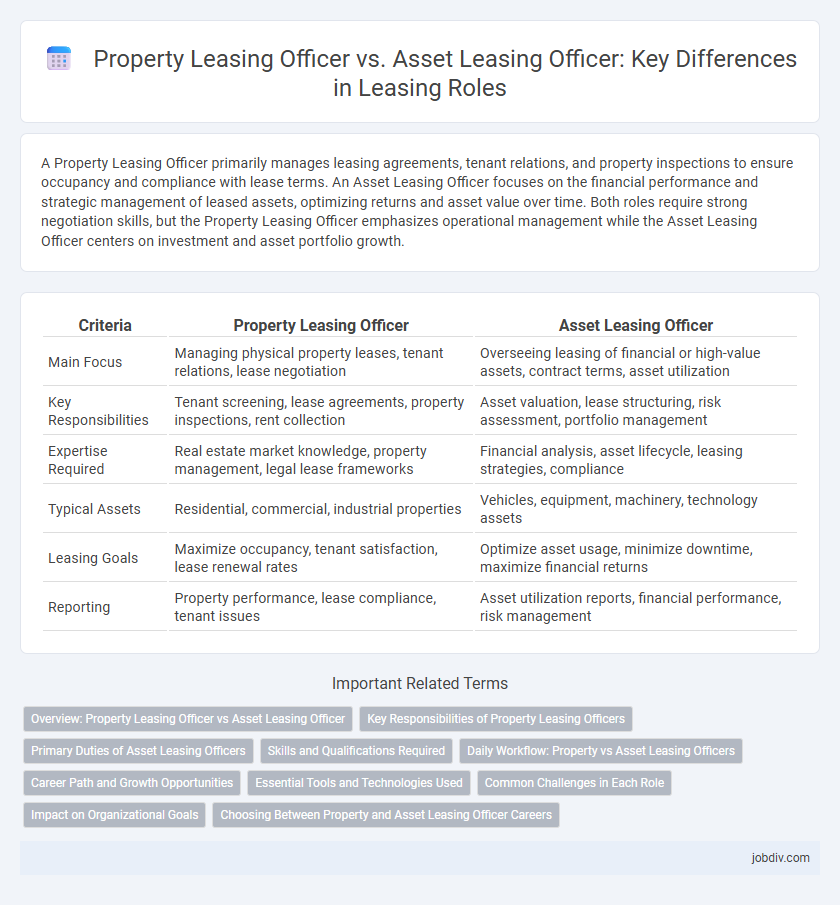A Property Leasing Officer primarily manages leasing agreements, tenant relations, and property inspections to ensure occupancy and compliance with lease terms. An Asset Leasing Officer focuses on the financial performance and strategic management of leased assets, optimizing returns and asset value over time. Both roles require strong negotiation skills, but the Property Leasing Officer emphasizes operational management while the Asset Leasing Officer centers on investment and asset portfolio growth.
Table of Comparison
| Criteria | Property Leasing Officer | Asset Leasing Officer |
|---|---|---|
| Main Focus | Managing physical property leases, tenant relations, lease negotiation | Overseeing leasing of financial or high-value assets, contract terms, asset utilization |
| Key Responsibilities | Tenant screening, lease agreements, property inspections, rent collection | Asset valuation, lease structuring, risk assessment, portfolio management |
| Expertise Required | Real estate market knowledge, property management, legal lease frameworks | Financial analysis, asset lifecycle, leasing strategies, compliance |
| Typical Assets | Residential, commercial, industrial properties | Vehicles, equipment, machinery, technology assets |
| Leasing Goals | Maximize occupancy, tenant satisfaction, lease renewal rates | Optimize asset usage, minimize downtime, maximize financial returns |
| Reporting | Property performance, lease compliance, tenant issues | Asset utilization reports, financial performance, risk management |
Overview: Property Leasing Officer vs Asset Leasing Officer
A Property Leasing Officer manages leasing agreements and tenant relationships for residential or commercial real estate properties, focusing on occupancy, rent collection, and property maintenance coordination. An Asset Leasing Officer oversees the strategic leasing and maximization of financial returns on a portfolio of leased assets, including real estate, equipment, or vehicles, ensuring alignment with organizational investment goals. Both roles require expertise in contract negotiation, market analysis, and regulatory compliance, but the Property Leasing Officer is more tenant-centric, while the Asset Leasing Officer emphasizes portfolio performance and asset optimization.
Key Responsibilities of Property Leasing Officers
Property Leasing Officers primarily manage tenant relations, lease negotiations, and contract enforcement to maximize property occupancy and revenue. They conduct market research to set competitive rental rates and oversee property inspections to ensure compliance with lease terms and maintenance standards. Asset Leasing Officers focus more on portfolio performance analysis and strategic asset management, making Property Leasing Officers critical for hands-on operational lease management.
Primary Duties of Asset Leasing Officers
Asset Leasing Officers primarily manage the leasing of high-value assets such as commercial equipment, vehicles, and machinery, ensuring optimal utilization and return on investment. Their duties include evaluating lease applications, negotiating terms, and coordinating asset maintenance and insurance to protect company interests. Unlike Property Leasing Officers who focus on real estate, Asset Leasing Officers emphasize asset lifecycle management and financial risk assessment related to leased assets.
Skills and Qualifications Required
A Property Leasing Officer requires expertise in tenant relations, lease negotiations, and property management, with strong communication and customer service skills typically supported by a degree in real estate or business administration. An Asset Leasing Officer demands advanced financial analysis, portfolio management, and strategic leasing skills, often requiring qualifications in finance, economics, or real estate investment. Both roles benefit from proficiency in market research, contract law, and negotiation techniques, but the Asset Leasing Officer prioritizes analytical and investment evaluation capabilities.
Daily Workflow: Property vs Asset Leasing Officers
Property Leasing Officers manage tenant relations, process lease agreements, and conduct property inspections to ensure compliance and maintain occupancy rates. Asset Leasing Officers focus on optimizing portfolio performance by analyzing asset value, coordinating lease renewals, and strategizing lease terms to maximize return on investment. Daily workflow for Property Leasing Officers centers on tenant engagement and site visits, while Asset Leasing Officers prioritize financial assessments and lease negotiations.
Career Path and Growth Opportunities
Property Leasing Officers primarily handle tenant relations, lease negotiations, and property marketing, focusing on maximizing occupancy rates and tenant satisfaction. Asset Leasing Officers concentrate on portfolio management, strategic asset allocation, and financial performance, often progressing toward senior roles in real estate investment or asset management. Career growth for Property Leasing Officers may lead to property management or regional leasing director roles, while Asset Leasing Officers typically advance to senior asset manager or real estate portfolio director positions.
Essential Tools and Technologies Used
Property Leasing Officers utilize customer relationship management (CRM) software, digital marketing platforms, and lease administration tools to efficiently manage tenant communications, advertising, and contract processing. Asset Leasing Officers leverage asset management systems, financial modeling software, and data analytics platforms to optimize portfolio performance, track asset valuation, and forecast leasing revenue. Both roles depend on integrated property management software to enhance operational efficiency and ensure accurate lease tracking.
Common Challenges in Each Role
Property Leasing Officers often face challenges related to tenant management, lease negotiation complexities, and maintaining high occupancy rates, whereas Asset Leasing Officers typically encounter difficulties in portfolio optimization, asset valuation, and aligning leasing strategies with long-term investment goals. Both roles require navigating regulatory compliance and market fluctuations, demanding strong analytical skills and adaptability. The distinct focus on operational tenant relations versus strategic asset management shapes the unique obstacles in each position.
Impact on Organizational Goals
Property Leasing Officers directly influence organizational goals by securing tenants and maintaining occupancy rates, which drives consistent revenue streams and operational stability. Asset Leasing Officers impact broader financial objectives by optimizing portfolio performance and enhancing asset value through strategic lease management and market analysis. Both roles contribute critically to achieving overall business growth, with Property Leasing Officers focusing on day-to-day lease execution and Asset Leasing Officers aligning leasing strategies with long-term investment goals.
Choosing Between Property and Asset Leasing Officer Careers
Choosing between Property Leasing Officer and Asset Leasing Officer careers depends on your expertise and interests in real estate management versus financial asset oversight. Property Leasing Officers manage tenant relationships, lease agreements, and property maintenance, focusing on residential or commercial real estate. Asset Leasing Officers focus on maximizing returns from leased equipment or financial assets, requiring strong skills in asset valuation and portfolio management.
Property Leasing Officer vs Asset Leasing Officer Infographic

 jobdiv.com
jobdiv.com